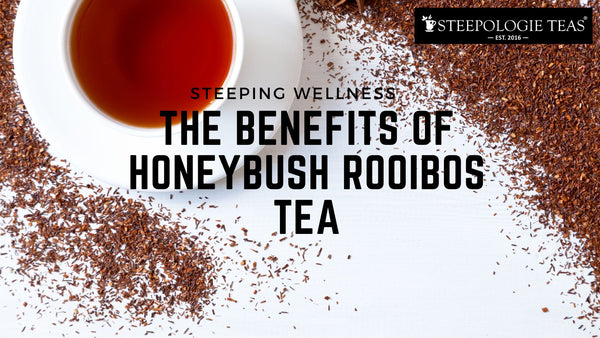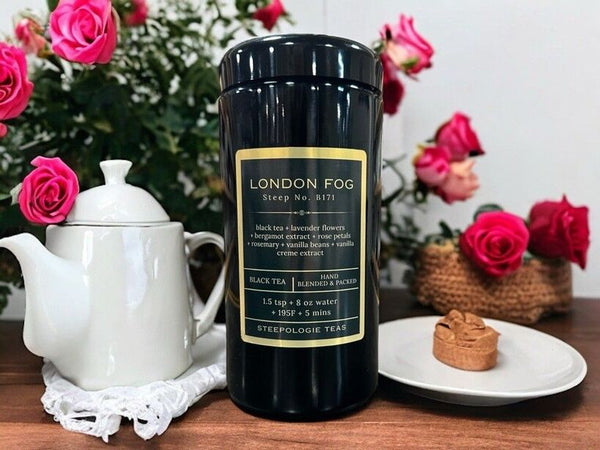
The Benefits of Honeybush Rooibos Tea
Honeybush tea hails from South Africa and is crafted by infusing dried honeybush leaves in near boiling water. Renowned for its myriad medicinal and therapeutic qualities, this herbal brew has garnered global acclaim. Delve into this article to uncover the potential perks and drawbacks of indulging in honeybush tea.
WE HAVE DOZENS OF ROOIBOS TEAS HERE>
What is Honeybush (Rooibos) Tea?
Honeybush is a shrub indigenous to the Eastern and Western Cape regions of South Africa, sharing botanical ties with rooibos within the Fabaceae family. Among approximately 23 Cyclopia species, Cyclopia intermedia takes center stage in the production of honeybush tea.
This robust plant can reach heights of up to 10 feet and is adorned with pale yellow blossoms emitting a delightful honey-like aroma and flavor, from which the tea derives its name.*1 Beyond its sweet profile, honeybush tea distinguishes itself as a caffeine-free alternative rich in nutrients and trace minerals like calcium, iron, and zinc.*2 Laden with beneficial plant compounds boasting antioxidant properties, it offers both a soothing evening beverage option and a refreshing iced tea alternative.
 The Honeybush Before Harvesting
The Honeybush Before Harvesting
Potential Benefits of Honeybush Tea
Since the early 19th century, honeybush tea has been employed to address various ailments, with much of its therapeutic potential attributed to its abundance of antioxidants.*3
Rich in Antioxidants
Antioxidants, crucial plant compounds, play a pivotal role in mitigating cellular damage due to oxidative stress.*4 Honeybush tea stands out for its abundance of polyphenols, including xanthones and flavanones, recognized for their antioxidant properties. Notably, mangiferin is the predominant xanthone present, while hesperidin and isokuranetin are the primary flavanones.*5 Renowned for their potent anti-inflammatory and potential cancer-fighting properties, mangiferin and hesperidin are believed to underpin many of honeybush's proposed health benefits.*6
Potentially Prevents Diabetes
Diabetes, a prevalent global condition impacting over 400 million individuals worldwide, encompasses type 1 and type 2 classifications, characterized by elevated blood sugar levels stemming from pancreatic dysfunction.*7 This dysfunction can manifest as reduced insulin production, low insulin secretion, or insulin resistance.
Emerging research indicates that the polyphenols found in honeybush tea could play a role in preventing, managing, and treating type 2 diabetes. Studies conducted in test tubes and animals highlight the potential of mangiferin to lower blood sugar levels by stimulating insulin secretion and facilitating the regeneration of damaged pancreatic cells.*8
Similarly, hesperidin has shown promise in animal studies by regulating key enzymes involved in sugar metabolism and safeguarding the pancreas against oxidative harm, thereby contributing to blood sugar level reduction.*9
Additionally, both mangiferin and hesperidin may aid in averting the advancement of diabetes-related complications such as kidney and nerve damage.*10
May Improve Bone Health
Honeybush tea could potentially enhance bone metabolism by influencing osteoclasts and osteoblasts, the key bone cells responsible for resorption and synthesis, respectively. Imbalance in these processes can elevate the risk of bone disorders such as arthritis and osteoporosis.*11
Encouragingly, research suggests that both mangiferin and hesperidin, present in honeybush tea, may positively impact bone health. Mangiferin appears to impede osteoclast formation, thereby reducing bone tissue breakdown, while hesperidin aids bone recovery by shielding osteoblasts from oxidative harm.*12 Consequently, incorporating honeybush tea into your routine might offer protective benefits for your bones.
May Have Cancer Fighting Properties
Certain compounds present in honeybush tea exhibit potential in combating cancer.
Both test-tube and animal studies indicate that the antioxidants found in the tea could effectively combat cancerous cells, shield against cancer-causing toxins, and impede the progression of specific cancer types.*13 Notably, mangiferin stands out for its robust anticancer properties, believed to hinder the initiation, advancement, and dissemination of cancer cells.*14
However, it's important to acknowledge that the fermentation process commonly employed in tea production may diminish the antioxidant content of the tea, potentially reducing its protective efficacy.*15 For instance, research suggests that unfermented honeybush tea showcased superior effectiveness in reducing total esophageal cancer size compared to its fermented counterpart in a study involving rats.*16
While the findings regarding the cancer-fighting potential of honeybush tea are encouraging, further human studies are imperative to ascertain its efficacy in this regard.
May Boost Skin Health
Both consuming honeybush tea and applying a honeybush tea extract topically have the potential to enhance skin health.
Research indicates that the extract may possess anti-aging properties, shielding skin cells from oxidative damage induced by UV radiation. This protective action may lead to a reduction in wrinkles and an enhancement in skin elasticity and hydration.*17
For instance, a 12-week study involving 120 individuals with crow’s feet wrinkles demonstrated that daily supplementation with the extract notably improved the overall skin wrinkle grade compared to a control group.*18 Furthermore, animal studies suggest that the extract could mitigate skin thickening and alleviate signs of sunburn, such as skin reddening and peeling.*19
Other Potential Benefits of Honeybush Tea
Honeybush tea could potentially offer a range of additional health advantages, such as:
- Anti-obesity effects: The antioxidants present in honeybush tea might impede fat accumulation in young fat cells and stimulate fat breakdown in mature fat cells.*20
- Menopausal symptom relief: The tea's isoflavone content, including phytoestrogens, could help alleviate menopausal symptoms.*21
- Support for the immune system: Test-tube studies suggest that mangiferin, a component of honeybush tea, may enhance the activity of macrophages, a type of white blood cell involved in immune response.*22
There are currently no reported side effects of drinking honeybush tea.
WE HAVE DOZENS OF ROOIBOS TEAS HERE>
*1 Source Researchgate
*2 Source National Library of Medicine
*3 Source National Library of Medicine
*4 Source National Library of Medicine
*5 Source National Library of Medicine
*6 Source National Library of Medicine and HERE
*7 Source National Library of Medicine
*8 Source National Library of Medicine
*9 Source National Library of Medicine
*10 Source National Library of Medicine and HERE
*11 Source National Library of Medicine
*12 Source National Library of Medicine and HERE and HERE
*13 Source National Library of Medicine and HERE
* 14 Source National Library of Medicine
*15 Source National Library of Medicine
*16 Source National Library of Medicine
*17 Source National Library of Medicine and HERE
*18 Source National Library of Medicine
*19 Source Science Direct and National Library of Medicine
*20 Source National Library of Medicine
*21 Source National Library of Medicine
*22 Source National Library of Medicine






